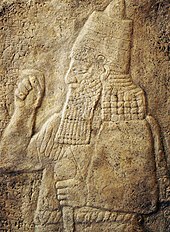Mount Judi
Mount Judi (Turkish: Cudi Dağı; Arabic: ٱلْجُودِيّ, romanized: Al-Jūdiyy;[1] Armenian: Արարադ; Kurdish: Çiyayê Cûdîyê) is a mountain in Turkey.
It was considered in antiquity to be Noah's apobaterion or "Place of Descent", the location where the Ark came to rest after the Great Flood, according to very early Christian and Islamic traditions (the latter based on the Quran, 11:44).
The identification of biblical Ararat with Mount Judi as the landing site of the ark persisted in Syriac and Armenian tradition throughout Late Antiquity.
Mount Judi is situated in Turkey's Şırnak Province, near the villages of Derebaşı and Boyunyaka, at latitude: 37°22'28.21" and longitude: 42°28'16.03".
[2] It is a peak northeast of the town of Cizre in south-east Turkey, at the headwaters of the Tigris River, near the modern border with Syria and that of Iraq.
[4] Syriac, Islamic, and early Christian traditions identify Mount Judi or Qardu as a peak near or northeast of the town of Jazirat ibn 'Umar in (modern Cizre) Upper Mesopotamia, at the headwaters of the Tigris River.
Arab historian Al-Masudi (d. 956), reported that the spot where the ark came to rest could be seen in his time, and that it was located at 80 parasangs (approximately 32 miles (51 km)) from the Tigris.
In his commentary about the Quran (11:4; the verse that mentions the landing of Noah's ark upon Al-Judiy), the English Orientalist George Sale said:[6] This mountain [al-Judi] is one of those that divide Armenia on the south, from Mesopotamia, and that part of Assyria which is inhabited by the Kurds, from whom the mountains took the name Cardu, or Gardu, by the Greeks turned into Gordyae, and other names.
[9] Sale goes on to say that there was once a famous Christian monastery on the mountain, but that this was destroyed by lightning in the year 776 AD, following which:[6] the credit of this tradition hath declined, and given place to another, which obtains at present, and according to which the ark rested on Mount Masis, in Armenia, called by the Turks Agri Dagi.The Arabic name of the mountain, Judi, has also been proposed to be a corruption of the Classical Syriac: ܩܪܕܘ, romanized: Qardō written in Arabic with the Arabic letters waw (و) and raa (ر) being confused in early Islamic manuscripts due to their early resemblance, and then making its way into the Qur’an and Islamic tradition.
Al-Mas'udi also said that the Ark began its voyage at Kufa in central Iraq, and sailed to Mecca, where it circled the Kaaba, before finally travelling to Judi.
